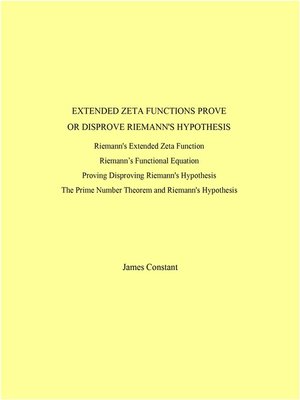Extended Zeta Functions Prove or Dis-prove Riemann's Hypothesis
ebook ∣ Mathematics
By James Constant

Sign up to save your library
With an OverDrive account, you can save your favorite libraries for at-a-glance information about availability. Find out more about OverDrive accounts.
Find this title in Libby, the library reading app by OverDrive.



Search for a digital library with this title
Title found at these libraries:
| Library Name | Distance |
|---|---|
| Loading... |
While extended zeta functions support investigations of Riemann's hypothesis and estimates for the Prime Number Theorem, some zeta functions offer better prospects for providing easy proofs, or disproofs. In 1859, Riemann had the idea to define Euler's function ε(x)=∑m^x for all complex numbers s=x+iy by analytic extension. This extension is important in number theory and plays a central role in the distribution of prime numbers. There are a number of ways of extending Euler's zeta function ζ(s) to points where 0≤x≤1. Because ζ(s) is an alternating series, it becomes possible to prove or disprove Riemann's Hypothesis.







